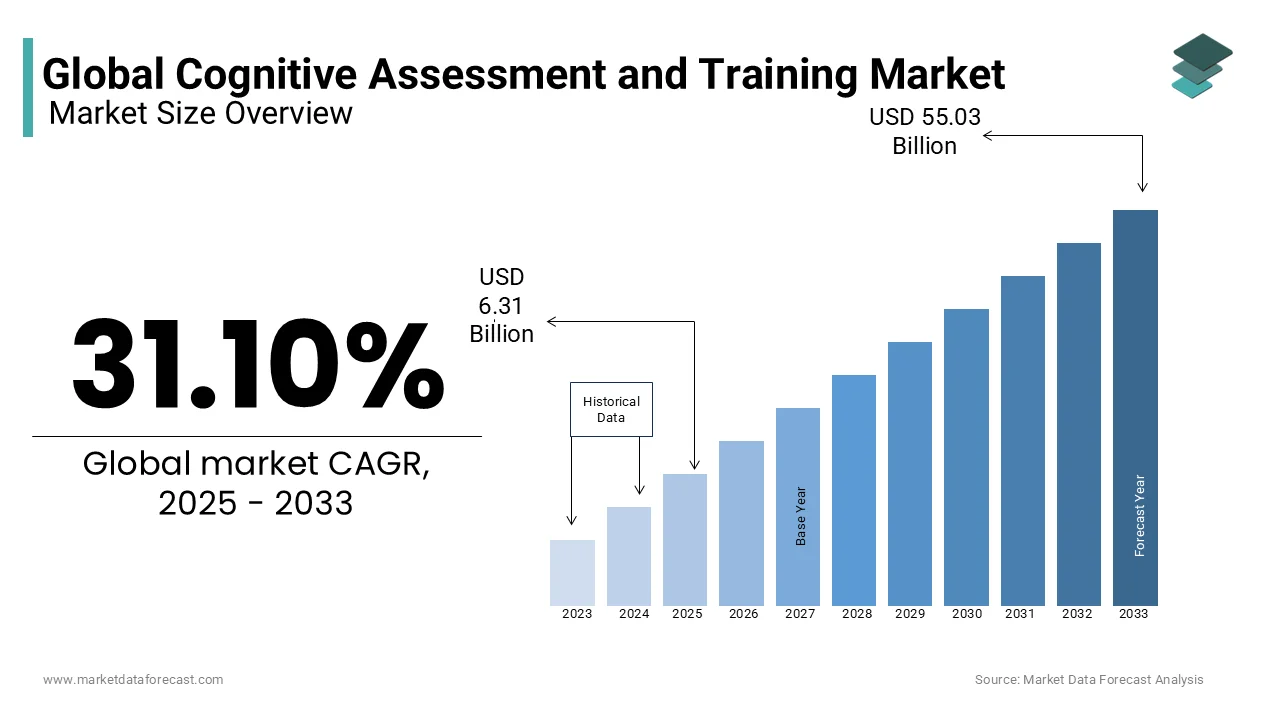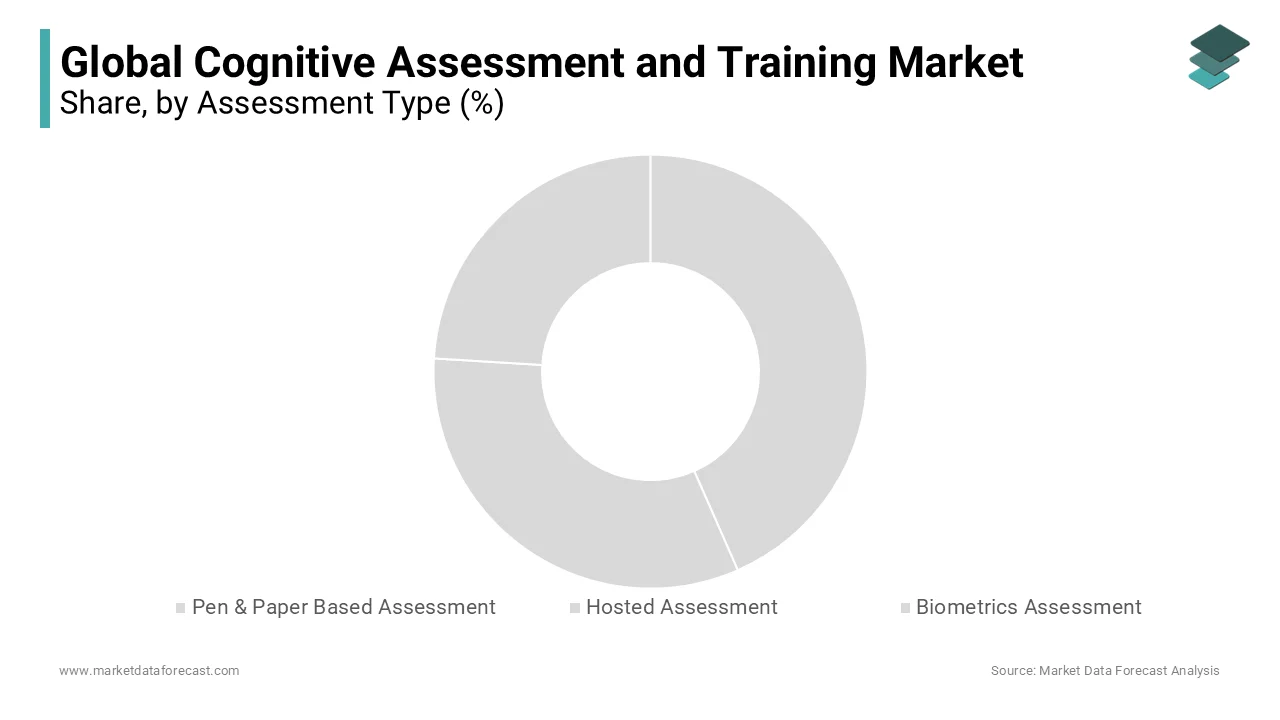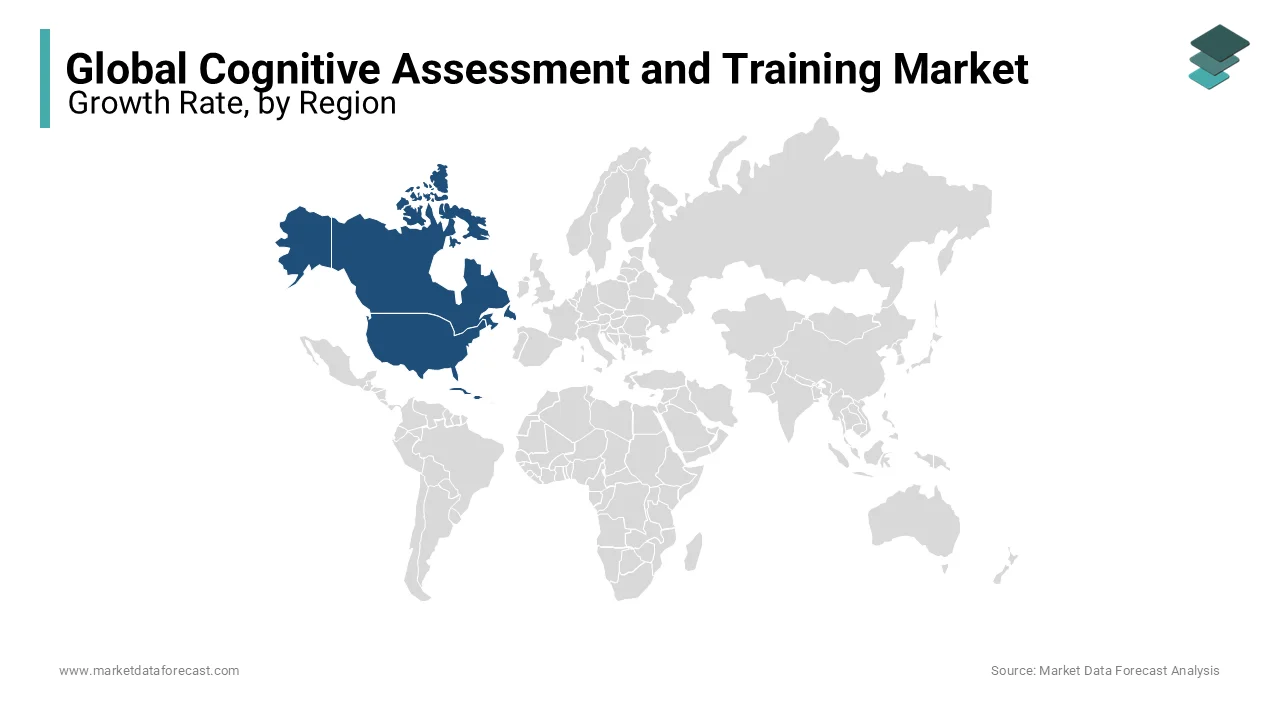Global Cognitive Assessment and Training Market Size, Share, Trends, & Growth Forecast Report By Assessment Type (Pen & Paper Based Assessment, Hosted Assessment, Biometrics Assessment), Component (Solutions, Services), Application (Clinical Trials, Classroom Learning, Corporate Learning, Brain Training, Research, Others), Vertical (Education, Healthcare, Business, Sports, Defense and Pharmaceuticals) & Region, Industry Forecast From 2024 to 2033
Global Cognitive Assessment and Training Market Size
The global cognitive assessment and training market was worth USD 4.81 billion in 2024. The global market is predicted to reach USD 6.31 billion in 2025 and USD 55.03 billion by 2033, growing at a CAGR of 31.10% during the forecast period 2025 to 2033.

Cognitive assessment and training are techniques for assessing IQ or intelligence level, perceptual skills, verbal and nonverbal skills, and other parameters. This test is used to detect symptoms of cognitive decline in patients. The factors contributing to the growth of the market are the increase in the geriatric population, awareness of the physical condition of the brain, and technological advances, among others. The analysis obtained after the cognitive evaluation is useful for various functions, such as the cognitive training of individuals, the early detection of dementia among the population, sports management, and others. Multiple tools are used to identify individuals who may need further evaluation, and these tests are currently widely used by organizations as part of the recruitment process. This process is used to assess a candidate's competence and aptitude for a position, as well as to predict his future performance, and these are the main characteristics that give rise to the market for cognitive evaluation and training.
MARKET DRIVERS
The growing aging of the people, and the ongoing technological advances.
The increasing demand for brain training in the next generation population, the growing aging of the people, and the ongoing technological advances in the healthcare industry are the main drivers of the cognitive assessment and training market.
In addition, dementia is one of the leading neurological diseases in the world, and the ability of these solutions to detect such neurological disorders is fueling the market growth. However, strict government regulations on global and negative advertising on the effectiveness of brain training are hampering the market growth. Besides, the growing demand for better brain fitness and an increasing number of industry players, resulting in increased competition for value-added solutions, should offer great opportunities for cognitive assessment and the training market. However, the time limitation in the development of clinically validated brain fitness software, negative media publicity on the effectiveness of brain training, and strict government regulations worldwide are hampering business expansion.
The number of clinical trials is expected to increase to the highest CAGR during the forecast period. Cognitive assessment and training solutions help detect even subtle signs of cognitive decline at an early stage due to age, neural disorders, and drug treatments. Cognitive assessment solutions are widely used to improve clinical research and development. The inclusion of computerized cognitive tests in the first phase of clinical trials identifies cognitive changes. Cognitive assessment and training solutions have also found applications in education. Education-related companies such as Pearson Evaluation and Houghton Mifflin Harcourt have established strong presences in various regions to provide a range of assessment and learning services.
Cognitive assessment and training exercises are used by a wide range of employers to make hiring decisions or to improve the mental performance of their employees. Furthermore, brain training includes intense cognitive and psychological exercises to focus and work on essential brain cognitive skills such as reading, writing, learning, memorizing, and reasoning. People's increased awareness of brain health has made brain training an attractive exercise that focuses on improving poor cognitive skills.
REPORT COVERAGE
|
REPORT METRIC |
DETAILS |
|
Market Size Available |
2024 to 2033 |
|
Base Year |
2024 |
|
Forecast Period |
2025 to 2033 |
|
CAGR |
31.1% |
|
Segments Covered |
By Assessment Type, Component, Application, Vertical, and Region. |
|
Various Analyses Covered |
Global, Regional, & Country Level Analysis, Segment-Level Analysis, DROC, PESTLE Analysis, Porter’s Five Forces Analysis, Competitive Landscape, Analyst Overview on Investment Opportunities |
|
Regions Covered |
North America, Europe, APAC, Latin America, Middle East & Africa |
|
Market Leaders Profiled |
Cambridge Cognition Ltd., Cogstate Ltd., MedAvante Inc., ProPhase LLC, Neurocog Trials Inc., Quest Diagnostics Inc., ProPhase LLC, Eresearchtechnology Inc., Gompf Brackets Inc, and Others. |
SEGMENTAL ANALYSIS
By Assessment Type Insights
The global market is separated into pen & paper-based assessment, hosted assessment, and biometrics assessment. The pen & paper-based assessment accounted for the dominant share of the worldwide business in the review period.

By Component Insights
The solutions segment is subdivided into evaluation, data management, project management, data analysis, and reporting, among other things.
The services segment is divided into training, support, and advice. Of these, the solutions segment accounts for a notable share that is likely to expand in the foreseen years.
By Application Insights
The global market for cognitive assessment and training is segmented into clinical trials, classroom learning, corporate learning, brain training, research, etc. Clinical trials are among the major segments of this business and are estimated to account for a considerable portion of the global revenue in the future.
By Vertical Insights
The global market for cognitive assessment and training is more segmented in education, healthcare, business, sports, defense, and pharmaceuticals. The education sector is foreseen to register the most substantial chunk of the global cognitive assessment and training market size.
REGIONAL ANALYSIS
North America is a leader in the cognitive assessment and training market due to its broad base of elderly and dementia patients. The increasing incidence of neurological diseases and the growing adoption of these techniques in schools and universities due to the proliferation of smartphones and tablets may also stimulate demand in the Asia-Pacific region, the Middle East, and Africa. Europe is foreseen to experience sustained demand due to the growth of the education sector.

KEY PARTICIPANTS IN THE MARKET
The main players described in the global cogntive assessment and training market include Cambridge Cognition Ltd., Cogstate Ltd., MedAvante Inc., ProPhase LLC, Neurocog Trials Inc., Quest Diagnostics Inc., ProPhase LLC, Eresearchtechnology Inc., and Gompf Brackets Inc. Current and future market trends are described to determine the overall attractiveness of the market.
RECENT HAPPENINGS IN THE MARKET
-
In October 2016, Quest Diagnostics and IBM Watson Health jointly launched IBM Watson Genomics. Quest Diagnostics uses IBM cognitive computing to help doctors provide cancer treatment.
-
In January 2017, Cambridge Cognition joined CPT, a trust intended to develop new treatments for Parkinson's disease. Thanks to this partnership, Cambridge Cognition has chosen CPT as its beneficiary, Charity of the Year 2017. All funds raised in 2017 will support CPT's research work.
-
In December 2016, ERT acquired Exco InTouch, an England-based clinical trial provider. The company focuses on patient engagement and data collection through mobile apps, which support ERT eCOA by offering patient-focused solutions.
MARKET SEGMENTATION
This research report on the global cognitive assessment and training market has been segmented and sub-segmented based on the assessment type, component, application, vertical, and region.
By Assessment Type
-
Pen & Paper Based Assessment
-
Hosted Assessment
-
Biometrics Assessment
By Component
-
Solutions
-
Services.
By Application
-
Clinical Trials
-
Classroom Learning
-
Corporate Learning
-
Brain Training
-
Research
By Vertical
-
Education
-
Healthcare
-
Business
-
Sports
-
Defense
-
Pharmaceuticals
By Region
-
North America
-
The United States
-
Canada
-
Rest of North America
-
-
Europe
-
The United Kingdom
-
Spain
-
Germany
-
Italy
-
France
-
Rest of Europe
-
-
The Asia Pacific
-
India
-
Japan
-
China
-
Australia
-
Singapore
-
Malaysia
-
South Korea
-
New Zealand
-
Southeast Asia
-
-
Latin America
-
Brazil
-
Argentina
-
Mexico
-
Rest of LATAM
-
-
The Middle East and Africa
-
Saudi Arabia
-
UAE
-
Lebanon
-
Jordan
-
Cyprus
-
Frequently Asked Questions
How are advancements in technology impacting the cognitive assessment and training market globally?
Technological advancements, including artificial intelligence (AI), virtual reality (VR), and wearable devices, are revolutionizing the cognitive assessment and training landscape by providing more accurate assessments, personalized training programs, remote monitoring capabilities, and engaging user experiences.
What are the primary applications of cognitive assessment and training solutions across different industries worldwide?
These solutions find applications in healthcare for early detection and management of cognitive disorders, in education for personalized learning and academic performance enhancement, in corporate settings for employee training and cognitive skill development, and in sports for cognitive performance optimization among athletes.
How are government initiatives influencing the cognitive assessment and training market globally?
Governments worldwide are increasingly investing in initiatives to promote brain health awareness, funding research and development in cognitive assessment and training technologies, implementing policies to integrate cognitive health into public healthcare systems, and supporting collaborations between industry stakeholders and academia.
What are the future trends expected to shape the global cognitive assessment and training market?
Anticipated trends include the integration of cognitive assessment and training into telehealth platforms, the development of gamified and immersive training experiences, increased focus on preventive cognitive health measures, expansion into emerging markets, and partnerships between tech companies and healthcare providers to deliver comprehensive cognitive care solutions.
Access the study in MULTIPLE FORMATS
Purchase options starting from $ 2500
Didn’t find what you’re looking for?
TALK TO OUR ANALYST TEAM
Need something within your budget?
NO WORRIES! WE GOT YOU COVERED!
Call us on: +1 888 702 9696 (U.S Toll Free)
Write to us: [email protected]